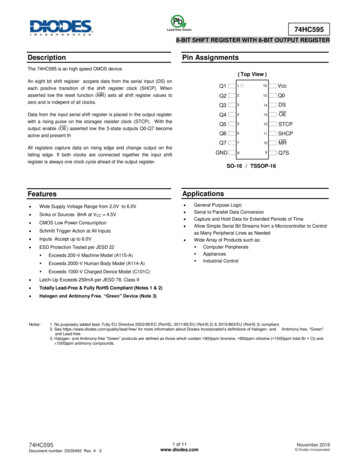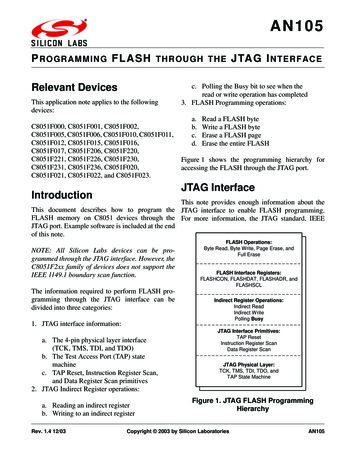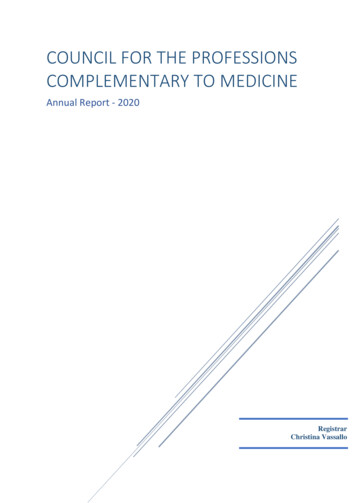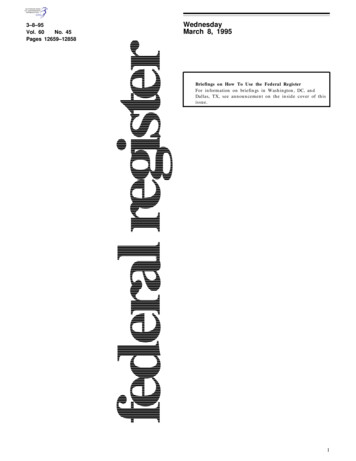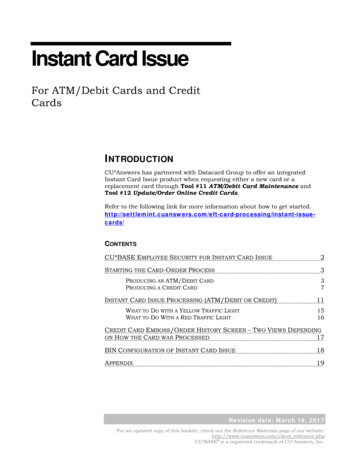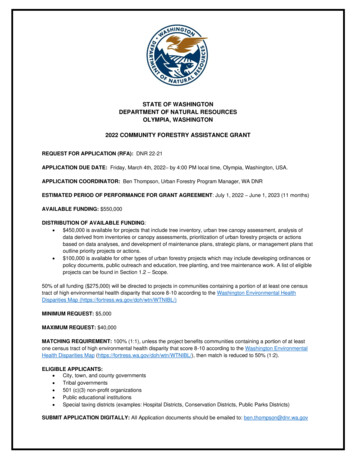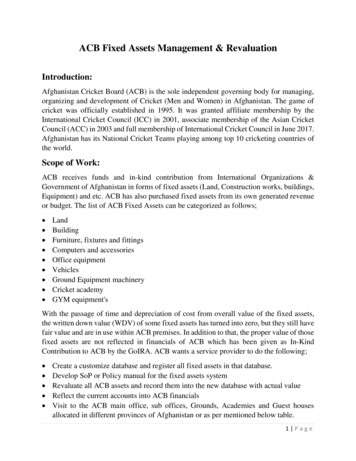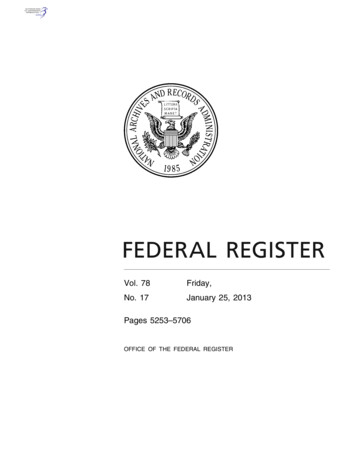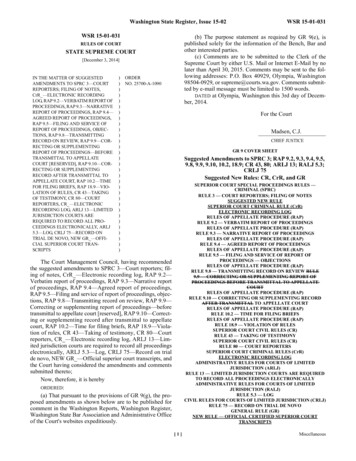
Transcription
Washington State Register, Issue 15-02WSR 15-01-031(b) The purpose statement as required by GR 9(e), ispublished solely for the information of the Bench, Bar andother interested parties.(c) Comments are to be submitted to the Clerk of theSupreme Court by either U.S. Mail or Internet E-Mail by nolater than April 30, 2015. Comments may be sent to the following addresses: P.O. Box 40929, Olympia, Washington98504-0929, or supreme@courts.wa.gov. Comments submitted by e-mail message must be limited to 1500 words.DATED at Olympia, Washington this 3rd day of December, 2014.RULES OF COURTSTATE SUPREME COURT[December 3, 2014]IN THE MATTER OF SUGGESTEDAMENDMENTS TO SPRC 3—COURTREPORTERS; FILING OF NOTES,CrR —ELECTRONIC RECORDINGLOG, RAP 9.2—VERBATIM REPORT OFPROCEEDINGS, RAP 9.3—NARRATIVEREPORT OF PROCEEDINGS, RAP 9.4—AGREED REPORT OF PROCEEDINGS,RAP 9.5—FILING AND SERVICE OFREPORT OF PROCEEDINGS, OBJECTIONS, RAP 9.8—TRANSMITTINGRECORD ON REVIEW, RAP 9.9—CORRECTING OR SUPPLEMENTINGREPORT OF PROCEEDINGS—BEFORETRANSMITTAL TO APPELLATECOURT [RESERVED], RAP 9.10—CORRECTING OR SUPPLEMENTINGRECORD AFTER TRANSMITTAL TOAPPELLATE COURT, RAP 10.2—TIMEFOR FILING BRIEFS, RAP 18.9—VIOLATION OF RULES, CR 43—TAKINGOF TESTIMONY, CR 80—COURTREPORTERS, CR —ELECTRONICRECORDING LOG, ARLJ 13—LIMITEDJURISDICTION COURTS AREREQUIRED TO RECORD ALL PROCEEDINGS ELECTRONICALLY, ARLJ5.3—LOG, CRLJ 75—RECORD ONTRIAL DE NOVO, NEW GR —OFFICIAL SUPERIOR COURT TRANSCRIPTS)))))))))))))))))))))))))))))))WSR 15-01-031ORDERNO. 25700-A-1090For the CourtMadsen, C.J.CHIEF JUSTICEGR 9 COVER SHEETSuggested Amendments to SPRC 3; RAP 9.2, 9.3, 9.4, 9.5,9.8, 9.9, 9.10, 10.2, 18.9; CR 43, 80; ARLJ 13; RALJ 5.3;CRLJ 75Suggested New Rules: CR, CrR, and GRSUPERIOR COURT SPECIAL PROCEEDINGS RULES —CRIMINAL (SPRC)RULE 3 — COURT REPORTERS; FILING OF NOTESSUGGESTED NEW RULESUPERIOR COURT CRIMINAL RULE (CrR)ELECTRONIC RECORDING LOGRULES OF APPELLATE PROCEDURE (RAP)RULE 9.2 — VERBATIM REPORT OF PROCEEDINGSRULES OF APPELLATE PROCEDURE (RAP)RULE 9.3 — NARRATIVE REPORT OF PROCEEDINGSRULES OF APPELLATE PROCEDURE (RAP)RULE 9.4 — AGREED REPORT OF PROCEEDINGSRULES OF APPELLATE PROCEDURE (RAP)RULE 9.5 — FILING AND SERVICE OF REPORT OFPROCEEDINGS — OBJECTIONSRULES OF APPELLATE PROCEDURE (RAP)RULE 9.8 — TRANSMITTING RECORD ON REVIEW RULE9.9 — CORRECTING OR SUPPLEMENTING REPORT OFPROCEEDINGS BEFORE TRANSMITTAL TO APPELLATECOURTRULES OF APPELLATE PROCEDURE (RAP)RULE 9.10 — CORRECTING OR SUPPLEMENTING RECORDAFTER TRANSMITTAL TO APPELLATE COURTRULES OF APPELLATE PROCEDURE (RAP)RULE 10.2 — TIME FOR FILING BRIEFSRULES OF APPELLATE PROCEDURE (RAP)RULE 18.9 — VIOLATION OF RULESSUPERIOR COURT CIVIL RULES (CR)RULE 43 — TAKING OF TESTIMONYSUPERIOR COURT CIVIL RULES (CR)RULE 80 — COURT REPORTERSSUPERIOR COURT CRIMINAL RULES (CrR)ELECTRONIC RECORDING LOGADMINISTRATIVE RULES FOR COURTS OF LIMITEDJURISDICTION (ARLJ)RULE 13 — LIMITED JURISDICTION COURTS ARE REQUIREDTO RECORD ALL PROCEEDINGS ELECTRONICALLYADMINISTRATIVE RULES FOR COURTS OF LIMITEDJURISDICTION (RALJ)RULE 5.3 — LOGCIVIL RULES FOR COURTS OF LIMITED JURISDICTION (CRLJ)RULE 75 — RECORD ON TRIAL DE NOVOGENERAL RULE (GR)NEW RULE — OFFICIAL CERTIFIED SUPERIOR COURTTRANSCRIPTSThe Court Management Council, having recommendedthe suggested amendments to SPRC 3—Court reporters; filing of notes, CrR —Electronic recording log, RAP 9.2—Verbatim report of proceedings, RAP 9.3—Narrative reportof proceedings, RAP 9.4—Agreed report of proceedings,RAP 9.5—Filing and service of report of proceedings, objections, RAP 9.8—Transmitting record on review, RAP 9.9—Correcting or supplementing report of proceedings—beforetransmittal to appellate court [reserved], RAP 9.10—Correcting or supplementing record after transmittal to appellatecourt, RAP 10.2—Time for filing briefs, RAP 18.9—Violation of rules, CR 43—Taking of testimony, CR 80—Courtreporters, CR —Electronic recording log, ARLJ 13—Limited jurisdiction courts are required to record all proceedingselectronically, ARLJ 5.3—Log, CRLJ 75—Record on trialde novo, NEW GR —Official superior court transcripts, andthe Court having considered the amendments and commentssubmitted thereto;Now, therefore, it is herebyORDERED:(a) That pursuant to the provisions of GR 9(g), the proposed amendments as shown below are to be published forcomment in the Washington Reports, Washington Register,Washington State Bar Association and Administrative Officeof the Court's websites expeditiously.[1]Miscellaneous
WSR 15-01-031Washington State Register, Issue 15-02Purpose:The Court Management Council (CMC), created bySupreme Court Order 25700-B-217 as a statewide forum forenhancing the administration of the courts, has identifiedopportunities to improve the quality and timeliness of transcripts that are necessary for appellate review. Current statutes and court rules lack adequate direction on the processand standards for authorizing persons to transcribe trial courtrecords. Consequently, there is great inconsistency across thestate on the qualifications and performance accountability fortranscriptionists completing verbatim report of proceedings.This contributes to incomplete or inaccurate transcripts,administrative inefficiency, and delays.With the support of the Board for Judicial Administration (BJA), the Court Management Council suggests ruleamendments and new rules that will promote consistent standards and practices for the creation, maintenance, and transmission of verbatim report of proceedings. These changes arenecessary to keep pace with changing technology and theincreased use of electronic recordings in the trial courts.Beginning in 2009, a CMC subcommittee consisting ofrepresentatives from all levels of court, conducted a comprehensive review of the statutes, rules, and practices that govern the verbatim report of proceedings in the courts of Washington. The CMC adopted revised guidelines for electronicrecordings in 2011, and then began working on suggestedchanges to court rules and statutes to implement best practices. An initial draft was presented to the Board for JudicialAdministration in September 2012 and referred to the judicialcommunity for further review and comment.The suggestions submitted to the Supreme Court are theproduct of input from the Washington Court Reporters' Association, Court of Appeals Rules Committee, Superior CourtJudges' Association, and the District and Municipal CourtJudges' Association in addition to the administrative groupsthat comprise the CMC (Clerk of the Supreme Court, Courtof Appeals Administrator/Clerks, Washington State Association of County Clerks, Washington Association of SuperiorCourt Administrators, Washington Association of JuvenileCourt Administrators, District and Municipal Court Management Association, and the Administrator for the Courts).BJA endorsed these suggested changes on December 16,2013.(c) The courtroom clerk will index the notes on a recordsinventory, noting the date of the notes. The courtroom clerkwill have the court reporter initial the inventory log as eachset of notes is received by the courtroom clerk.(d) (c) Court reporter's notes The stenographic notes ofthe hearing shall be indexed and stored by the county clerk'soffice, any audio or video tapes, and any other electronic datamedium containing notes of any hearing shall be stored bythe clerk's office in an exhibit box labeled with the defendant's name and cause number to allow easy retrieval ofnotes. Sealed notes are to be marked "SEALED" in red ink andmaintained in accordance with GR 15.(e) (d) Court reporter's notes of the hearing, any audio orvideo tapes, and any other electronic data medium containingnotes of any hearing, sealed or unsealed, shall not be provided to anyone except the court reporter who produced thenotes, unless a court order provides otherwise.(f) (e) A court reporter may withdraw the stenographiccourt reporter's notes any video or audio tapes, and any otherelectronic data medium containing notes of a hearing asrequired for transcription upon completing a request slip. Thestenographic court reporter's notes, any audio or video tapes,and any other electronic data medium containing notes shallbe returned to the county clerk's office at the same time thetranscript is filed for transmission to an with an appellatecourt.[Adopted effective December 30, 1997.]SUGGESTED NEW RULESUPERIOR COURT CRIMINAL RULECrRELECTRONIC RECORDING LOGWhen the proceedings are electronically recorded, thecourt shall ensure that a written log of the proceedings is created that indicates the time of relevant events.The judicial officer shall call the case name and causenumber of each proceeding and shall assure that all case participants identify themselves for the record.SUGGESTED AMENDMENTRULES OF APPELLATE PROCEDURE (RAP)RULE 9.2VERBATIM REPORT OF PROCEEDINGS(a) Transcription and Statement of Arrangements. Ifthe party seeking review intends to provide a verbatim reportof proceedings, the party should arrange for transcription ofand payment for an original and one copy of the verbatimreport of proceedings within 30 days after the notice ofappeal was filed or discretionary review was granted. If theproceeding being reviewed was recorded on videotape, transcription of the videotapes shall be completed by a courtapproved transcriber in accordance with procedures developed by the Office of the Administrator for the Courts. Copies of these procedures are available at the court administrator's office in each county where there is a courtroom thatvideotapes proceedings or through the Office of the Administrator for the Courts. The party seeking review must file withthe appellate court and serve on all parties of record and allnamed court reporters or authorized transcriptionists a statement that arrangements have been made for the transcriptionof the report and file proof of service with the appellate court.SUGGESTED AMENDMENTSUPERIOR COURT SPECIAL PROCEEDINGS RULES — CRIMINAL (SPRC)RULE 3COURT REPORTERS; FILING OF NOTES(a) At the commencement of a capital case, the trial courtwill designate one or more court reporters for that case. Tothe extent practical, only designated reporters will report allhearings.(b) As soon as possible after each hearing, the courtreporter's notes, including electronic and nonelectronic stenographic the court reporter will transmit stenographic notes,any audio or video tapes, and any other electronic datamedium containing notes of the hearing, will be submitted tothe courtroom clerk county clerk's office.Miscellaneous[2]
Washington State Register, Issue 15-02The statement must be filed within 30 days after the notice ofappeal was filed or discretionary review was granted. Theparty must indicate the date that the report of proceedingswas ordered, the financial arrangements which have beenmade for payment of transcription costs, the name of eachcourt reporter or authorized transcriptionist other personauthorized to prepare preparing a verbatim report of proceedings who will be preparing the transcript, the hearing dates,and the trial court judge. If the party seeking review does notintend to provide a verbatim report of proceedings, a statement to that effect should be filed in lieu of a statement ofarrangements within 30 days after the notice of appeal wasfiled or discretionary review was granted and served on allparties of record.(b) Content. A party should arrange for the transcriptionof all those portions of the verbatim report of proceedingsnecessary to present the issues raised on review. A verbatimreport of proceedings provided at public expense will notinclude the voir dire examination or opening statement unlessso ordered by the trial court. If the party seeking reviewintends to urge that a verdict or finding of fact is not supported by the evidence, the party should include in the recordall evidence relevant to the disputed verdict or finding. If theparty seeking review intends to urge that the court erred ingiving or failing to give an instruction, the party shouldinclude in the record all of the instructions given, the relevantinstructions proposed, the party's objections to the instructions given, and the court's ruling on the objections.(c) Notice of Partial Report of Proceedings andIssues. If a party seeking review arranges for less than all ofthe verbatim report of proceedings, the party should includein the statement of arrangements a statement of the issues theparty intends to present on review. Any other party whowishes to add to the verbatim report of proceedings shouldwithin 10 days after service of the statement of arrangementsfile and serve on all other parties and the court reporter orauthorized transcriptionist a designation of additional parts ofthe verbatim report of proceedings and file proof of servicewith the appellate court. If the party seeking review refuses toprovide the additional parts of the verbatim report of proceedings, the party seeking the additional parts may providethem at the party's own expense or apply to the trial court foran order requiring the party seeking review to pay for theadditional parts of the verbatim report of proceedings.(d) Payment of Expenses. If a party fails to makearrangements for payment of the costs of the verbatim reportof proceedings at the time the verbatim report of proceedingsis ordered, the party may be subject to sanctions as providedin rule 18.9.(e) Title Page and Table of Contents. The courtreporter or other authorized transcriber shall include at thebeginning of each volume of the verbatim report of proceedings a title page and a table of contents.(1) The title page should include the following:(A) Case name,(B) Trial court and appellate cause numbers,WSR 15-01-031(C) Date(s) of hearings,(D) Trial court judge(s),(E) Names of attorneys at trial,(F) Name, business address and telephone number ofeach court reporter or other authorized transcriber.(2) The table of contents shall follow the title page andshall indicate, under the headings listed below, the pageswhere the following appear:(A) Proceedings. The beginning of each proceeding andthe nature of that proceeding;(B) Testimony. The testimony of each witness, the pagewhere it begins, and the type of examination, i.e., direct,cross, re-direct, re-cross, and the page where the plaintiffrests and the defendant rests;(C) Exhibits. The admission into evidence of exhibitsand depositions;(D) Argument. The pages where opening statementsoccur, except as otherwise provided in rule 9.2(b) for verbatim reports of proceedings provided at public expense, andthe pages where closing arguments occur;(E) Instructions. All instructions proposed and given.Any other events should be listed under a suitable headingwhich would help the reviewing court locate separate parts ofthe verbatim report of proceedings.(F) Multiple Days. If a volume includes hearings frommore than one day, there shall be a separate table of contentsfor each day.(f) Form.(1) Generally. The verbatim report of proceedings shallbe on 8-1/2-by 11-inch paper. Margins shall be lined 1-3/8inches from the left and 5/8 inches from the right side of eachpage. Indentations from the left lined margin should be: 1space for "Q" and "A"; 5 spaces for the body of the testimony; 8 spaces for commencement of a paragraph; and 10spaces for quoted authority. Typing should be double spacedexcept that comments by the reporter should be singlespaced. The page should have 25 lines of type. Type must bepica type or its equivalent with no more than 10 characters aninch.(A) Witnesses Designated/Examination. Indicate at thetop or bottom of each page the name of the witness andwhether the examination is on direct, cross, re-direct, recross, or rebuttal.(B) Jury In/Out. Indicate when the jury is present, whenthe jury leaves, and when the jury returns.(C) Bench/Side Bar Conferences. Designate whether abench/side bar conference is on or off the record.(D) Chamber Conferences. If the conference is recorded,note the presence or absence of persons participating inchamber conferences.(E) Speaker/Event Identification. Identify speakers andevents that occur throughout the proceedings in capital letterscentered on the appropriate line. For example: recess/courtreconvene; direct examination, cross examination, re-directexamination, re-cross examination, plaintiff rests; defendant's evidence: direct examination, cross examination, redirect examination, re-cross examination, defense rests;instructions, conference, closing arguments: for plaintiff, fordefense, and rebuttal.[3]Miscellaneous
WSR 15-01-031Washington State Register, Issue 15-02(2) Volume and Pages.(A) Pages in each volume of the verbatim report of proceedings shall be numbered consecutively and be arranged inchronologic order by date of hearing(s) requested in the statement of arrangements.(B) Each volume of the verbatim report of proceedingsshall include no more than 200 pages. The page numbers inthe first volume should start with page 1 and continue to 200,as needed, regardless of how many hearing dates are includedin the volume. In the second volume of the verbatim report ofproceedings and subsequent volume page numbers shouldstart with the next page number in sequence where the previous volume ended. The volumes shall be either bound or fastened securely.(3) Copies. The verbatim report of proceedings shouldbe legible, clean and reproducible.[Adopted July 1, 1976; amended effective December 10,1993.]SUGGESTED AMENDMENTRULES OF APPELLATE PROCEDURERAP 9.5FILING AND SERVICE OF REPORT OF PROCEEDINGS —OBJECTIONS(a) Generally. The party seeking review must file anagreed or narrative report of proceedings with the clerk of thetrial appellate court within 60 days after the statement ofarrangements is filed. The court reporter or person authorized— transcriptionist authorized to prepare preparing the a verbatim report of proceedings must file it in the appellate courtwithin 60 days after the statement of arrangements is filedand all named court reporters or authorized transcriptionistsare served. If the proceeding being reviewed was recorded onvideotape, the transcript must be filed by the transcriber withthe clerk of the trial court within 60 days after the statementof arrangements is filed and all named court reporters areserved. The court reporter or authorized transcriptionist shallpromptly serve notice of filing on all parties, and shall provide a copy of the report of proceedings to the party whoarranged for transcript.(1) A party filing a brief must promptly forward a copyof the verbatim report of proceedings with a copy of the briefto the party with the right to file the next brief. If more thanone party has the right to file the next brief, the parties mustcooperate in the use of the report of proceedings. The partywho files the last brief should return the copy of the report ofproceedings to the party who paid for it.(2) ((If the transcript was computer-generated, one diskette or compact disk (using ASCII format with hard pagereturns))) A searchable PDF electronic copy of the verbatimreport of proceedings shall be filed with the original verbatimreport of proceedings, with a copy and a second diskette orcompact disk shall be provided to the party who receivescaused the verbatim report of proceedings to be filed. Thereport of proceedings may be electronically filed with theappellate court in accordance with the court's filing procedures. The party who files the last brief should return the diskette or compact disk to the party who paid for the verbatimreport of proceedings.(b) Additional Time for Filing and Service of VerbatimReport of Proceedings. If a verbatim report of proceedingscannot be completed within 60 days after the statement ofarrangements is filed and served, the court reporter or authorized person transcriptionist shall, no later than 10 daysbefore the report of proceedings is due to be filed, submit anaffidavit to the party who ordered the report of proceedingsstating the reasons for the delay. The party who requested theverbatim report of proceedings should move for an extensionof time from the appellate court. The clerk will notify the parties of the action taken on the motion. When the courtreporter or authorized person files the verbatim report of proceedings, a copy shall be provided to the party who arrangedfor transcription and either the reporter or authorized personshall serve and file notice of the filing on all other parties andthe appellate court. The notice of filing served on the appellate court shall include a declaration that (1) the transcriptwas computer generated and an ASCII diskette or compact[Originally effective July 1, 1976; amended effective July 2,1976; September 1, 1985; September 1, 1993; December 10,1993; September 1, 1994; September 1, 1998; December 24,2002; September 1, 2010.]ReferencesForm 15, Statement of Arrangements; Title 6, Acceptance ofReview.SUGGESTED AMENDMENTRULES OF APPELLATE PROCEDURERULE 9.3NARRATIVE REPORT OF PROCEEDINGSThe party seeking review may prepare a narrative reportof proceedings. A party preparing a narrative report mustexercise the party's best efforts to include a fair and accuratestatement of the occurrences in and evidence introduced inthe trial court material to the issues on review. A narrativereport should be in the same form as a verbatim report, asprovided in rule 9.2 (e) and (f). If any party prepares a verbatim report of proceedings, that report will be used as thereport of proceedings for the review. A narrative report ofproceedings may be prepared if either the court reporter'snotes or the electronic recording the videotape of the proceeding being reviewed are is lost or damaged.[Adopted effective July 1, 19976; amended effective December 10, 1993.]SUGGESTED AMENDMENTRULES OF APPELLATE PROCEDURERAP 9.4AGREED REPORT OF PROCEEDINGSThe parties may prepare and sign an agreed report of proceedings setting forth only so many of the facts averred andproved or sought to be proved as are essential to the decisionof the issues presented for review. The agreed report of proceedings must include only matters which were actuallybefore the trial court. An agreed report of proceedings shouldbe in the same form as a verbatim report, as provided in rule9.2 (e) and (f). An agreed report of proceedings may be prepared if either the court reporter's notes or the electronicrecording videotape of the proceeding being reviewed are islost or damaged.Miscellaneous[4]
Washington State Register, Issue 15-02disc was filed or (2) the transcript was not computer generated. Failure to timely file the verbatim report of proceedingsand notice of service may subject the court reporter or authorized person transcriptionist to sanctions as provided in rule18.9.(c) Objections to Report of Proceedings. A party mayserve and file objections to, and propose amendments to, anarrative report of proceedings or a verbatim report of proceedings within 10 days after receipt of the report of proceedings or receipt of the notice of filing of the report of proceedings with the appellate court. If objections or amendments tothe report of proceedings are served and filed, any objectionsor proposed amendments must be heard by the trial courtjudge before whom the proceedings were held for settlementand approval, except objections to the form of a report of proceedings, which shall be heard by motion in the appellatecourt. The court may direct a party or a court reporters orauthorized transcriber transcriptionists to pay for the expenseof any modifications of the proposed report of proceedings.The motion procedure of the court deciding any objectionsshall be used in settling the report of proceedings.(d) Substitute Judge May Settle Report of Proceedings. If the judge before whom the proceedings were held isfor any reason unable to promptly settle questions as provided in section (c), another judge may act in the place of thejudge before whom the proceedings were held.WSR 15-01-031[Originally effective July 1, 1976; amended effective July 2,1976; September 1, 1994; September 1, 1998; September 1,2010.]SUGGESTED AMENDMENTRULES OF APPELLATE PROCEDURERULE 9.9CORRECTING OR SUPPLEMENTING REPORT OF PROCEEDINGS BEFORE TRANSMITTAL TO APPELLATE COURT[Reserved.] The report of proceedings may be correctedor supplemented by the trial court on motion of a party, or onstipulation of the parties, at any time prior to the transmissionof the report to the appellate court. The trial court mayimpose the same kinds of sanctions provided in rule 18.9(a)as a condition to correcting or supplementing the report ofp0roceedings after the time provided in rule 9.5.[Originally effective July 1, 1976.]SUGGESTED AMENDMENTRULES OF APPELLATE PROCEDURE (RAP)RAP 9.10CORRECTING OR SUPPLEMENTING RECORD AFTERTRANSMITTAL TO APPELLATE COURTIf a party has made a good faith effort to provide thoseportions of the record required by rule 9.2(b), the appellatecourt will not ordinarily dismiss a review proceeding oraffirm, reverse, or modify a trial court decision or administrative adjudicative order certified for direct review by the superior court because of the failure of the party to provide theappellate court with a complete record of the proceedingsbelow. If the record is not sufficiently complete to permit adecision on the merits of the issues presented for review, theappellate court may, on its own initiative or on the motion ofa party (1) direct the transmittal of additional clerk's papersand exhibits or administrative records and exhibits certifiedby the administrative agency, or (2) correct, or direct the supplementation or correction of, the report of proceedings. Theappellate court or trial court may impose sanctions as provided in rule 18.9(a) as a condition to correcting or supplementing the record on review. The party directed or permittedto supplement the record on review must file either a designation of clerk's papers as provided in rule 9.6 or a statement ofarrangements as provided in rule 9.2 within the time set bythe appellate court.[Originally effective July 1, 1976; amended effective September 1, 1985; September 1, 1990; September 21, 1990;December 10, 1993; September 1, 1994; September 1, 1998;December 24, 2002; September 1, 2007; September 1, 2010.]SUGGESTED AMENDMENTRULES OF APPELLATE PROCEDURE (RAP)RULE 9.8TRANSMITTING RECORD ON REVIEW CLERK'S PAPERS ANDEXHIBITS(a) Duty of Trial Court Clerk. Except as provided insection (b), the clerk of the trial court shall send the clerk'spapers and exhibits to the appellate court when the clerkreceives payment for the preparation of the documents. andshall send the verbatim report of proceedings to the appellatecourt at the end of the objection period set forth in rule 9.5.The clerk shall endorse on the face of the record the date uponwhich the record on review clerk's papers is are transmitted tothe appellate court.(b) Cumbersome Exhibits. The clerk of the trial courtshall transmit to the appellate court exhibits which are difficult or unusually expensive to transmit only if the appellatecourt directs or if a party makes arrangements with the clerkto transmit the exhibits at the expense of the party requestingthe transfer of the exhibits. No weapons, controlled substances, hazardous items, or currency shall be forwardedunless directed by the appellate court.(c) Temporary Transmittal to another Court. If therecord or any part of it is needed in another court while areview is pending, the clerk of the appellate court will, on theorder or ruling of the appellate court, transmit the record orpart of it to the clerk of that court, to remain there until thepurpose for which it is transmitted has been satisfied or untilthe clerk of the appellate court requests its return.[Originally effective July 1, 1976; amended effective September 1, 1994; September 1, 1998.]SUGGESTED AMENDMENTRULES OF APPELLATE PROCEDURERULE 10.2TIME FOR FILING BRIEFS(a) Brief of Appellant or Petitioner. The brief of anappellant or petitioner should be filed with the appellate courtwithin 45 days after the report of proceedings is filed in thetrial appellate court; or, if the record on review does notinclude a report of proceedings, within 45 days after the partyseeking review has filed the designation of clerk's papers andexhibits in the trial court.[5]Miscellaneous
WSR 15-01-031Washington State Register, Issue 15-02court may condition a party's right to participate further in thereview on compliance with terms of an order or ruling including payment of an award which is ordered paid by the party.If an award is not paid within the time specified by the court,the appellate court will transmit the award to the superiorcourt of the county where the case arose and direct the entryof a judgment in accordance with the award.(b) Dismissal on Motion of Commissioner or Clerk.The commissioner or clerk, on 10 days' notice to the parties,may (1) dismiss a review proceeding as provided in section(a) and (2) except as provided in rule 18.8(b), will dismiss areview proceeding for failure to timely file a notice of appeal,a notice for discretionary review, a motion for discretionaryreview of a decision of the Court of Appeals, or a petition forreview. A party may object to the ruling of the commissioneror clerk only as provided in rule 17.7.(c) Dismissal on Motion of Party. The appellate courtwill, on motion of a party, dismiss review of a case (1) forwant of prosecution if the party seeking review has abandoned the review, or (2) if the application for review is frivolous, moot, or solely for the purpose of delay, or (3) except asprovided in rule 18.8(b), for failure to timely file a notice ofappeal, a notice of discretionary review, a motion for discretionary review of a decision of the Court of Appeals, or apetition for review.(d) Objection to Ruling. A counsel upon whom sanctions have been imposed or a party may object to the ruling ofa commissioner or the clerk only as provided
washington state register, issue 15-02 wsr 15-01-031 [ 1 ] miscellaneous wsr 15-01-031 rules of court. state supreme court [december 3, 2014] in the matter of suggested amendments to sprc 3—court reporters; filing of notes, crr_—electronic recording log, rap 9.2—verbatim report of proceedings, rap 9.3—narrative report of proceedings .
